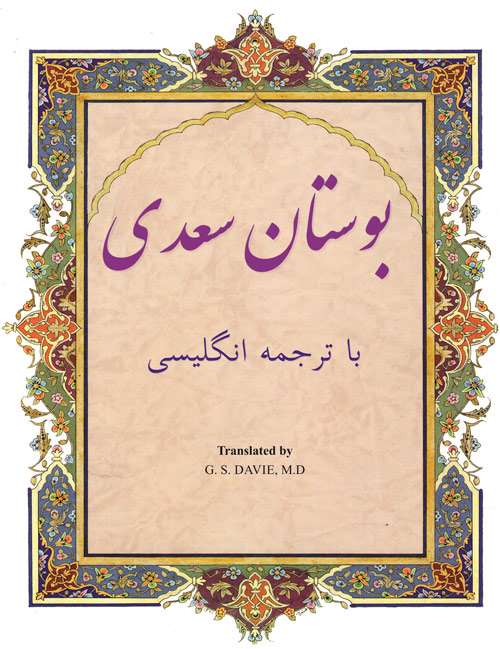
How Daqúqí went forward to lead that company (in prayer). پیش رفتن دقوقی به امامت آن قوم
در تحیات و سلام الصالحین مدح جملهی انبیا آمد عجین
In the salutations and benedictions addressed to the righteous (saints) praise of all the prophets is blended.
مدحها شد جملگی آمیخته کوزهها در یک لگن در ریخته
The praises are all commingled (and united): the jugs are poured into one basin.
زانک خود ممدوح جز یک بیش نیست کیشها زین روی جز یک کیش نیست
Inasmuch as the object of praise Himself is not more than One, from this point of view (all) religions are but one religion.
دان که هر مدحی بنور حق رود بر صور و اشخاص عاریت بود
Know that every praise goes (belongs) to the Light of God and is (only) lent to (created) forms and persons.
مدحها جز مستحق را کی کنند لیک بر پنداشت گمره میشوند
How should folk praise (any one) except Him who (alone) has the right (to be praised)? but they go astray on (the ground of) a vain fancy.
همچو نوری تافته بر حایطی حایط آن انوار را چون رابطی
The Light of God in relation to phenomena is as a light shining upon a wall the wall is a link (focus) for these splendours:
لاجرم چون سایه سوی اصل راند ضال مه گم کرد و ز استایش بماند
Necessarily, when the reflexion moved towards its source, he who had gone astray lost the moon and ceased from praise;
یا ز چاهی عکس ماهی وا نمود سر بچه در کرد و آن را میستود
Or (again) a reflexion of the moon appeared from a well, and he (the misguided one) put his head into the well and was praising that same (reflexion):
در حقیقت مادح ماهست او گرچه جهل او بعکسش کرد رو
In truth he is a praiser of the moon, although his ignorance has turned its face towards its (the moon’s) reflexion.
مدح او مهراست نه آن عکس را کفر شد آن چون غلط شد ماجرا
His praise belongs to the moon, not to that reflexion, (but) that (praise) becomes infidelity when the matter is misapprehended;
کز شقاوت گشت گمره آن دلیر مه به بالا بود و او پنداشت زیر
For that bold man was led astray by (his) perdition: the moon was above, while he fancied it was below.
زین بتان خلقان پریشان میشوند شهوت رانده پشیمان میشوند
The people are distracted by these idols (objects of desire), and (afterwards) they repent of the lust which they have indulged,
زآنک شهوت با خیالی رانده است وز حقیقت دورتر وا مانده است
Because he (such a one) has indulged his lust with a phantom and has remained farther away from the Reality (than he was before).
با خیالی میل تو چون پر بود تا بدان پر بر حقیقت بر شود
Your desire for a phantom is like a wing, so that by means of that wing he (the seeker) may ascend to the Reality.
چون براندی شهوتی پرت بریخت لنگ گشتی و آن خیال از تو گریخت
When you have indulged a lust, your wing drops off; you become lame, and that phantom flees from you.
پر نگه دار و چنین شهوت مران تا پر میلت برد سوی جنان
Preserve the wing and do not indulge such lust, to the end that the wing of desire may bear you to Paradise.
خلق پندارند عشرت میکنند بر خیالی پر خود بر میکنند
The people fancy they are enjoying themselves: they are (really) tearing out their wings for the sake of a phantom.
وامدار شرح این نکته شدم مهلتم ده معسرم زان تن زدم
I have become a debtor for (I owe) the explanation of this topic. Give me time, I am destitute; on that account I keep silence.
Special Offers
by: Reza about (category: Masnavi, Persian Poetry)
















What people say about "How Daqúqí went forward to lead"?
No one replied yet.